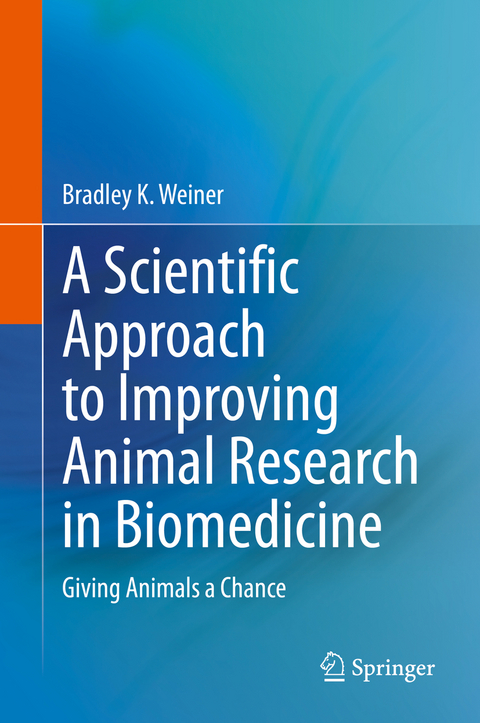
A Scientific Approach to Improving Animal Research in Biomedicine
Springer International Publishing (Verlag)
978-3-031-24676-0 (ISBN)
- Titel wird leider nicht erscheinen
- Artikel merken
Bradley Weiner, MD is Professor, Vice Chairman (Academics), Founding Residency Program Director, Chief of Spinal Surgery, and Medical Director of the Center for Regenerative Medicine in Orthopaedic Surgery at Houston Methodist Hospital. Dr. Weiner established a laboratory at Houston Methodist in 2009 with the aim of using cutting edge basic science technologies (i.e., nanotech and polymers) in novel ways to address surgical problems. The lab has obtained funding and grants nearing $20M over the past twelve years, including grants from DARPA and the Department of Defense. Translational animal research is a main portion of the research carried out in the lab. Dr. Weiner has also served for a decade as founding Deputy Editor for Evidence and Methods at the top rated journal in his field; served as an international editor for the back and neck group of Cochrane; serve as long-term Chair of Business Practices at his home institution, working with IRBs, IACUC, conflicts of interest, etc. His undergraduate degree is in Philosophy (Analytic) and, over the years, he has published multiple articles, given lectures on medical-philosophical issues that have included discussions on the profit motive in medicine, access to care, the impact of medical diagnoses, the biopsychosocial model, as well as other subjects.
1. Introduction
This chapter will outline the reasons for the book having been written. It will cover the potential benefits of animal research to medicine and human health; and discuss why that potential is so rarely actualized. The common thread being a failure of scientific methodology.
2. CritiqueThis section will include chapters delineating these failures of methodology and explore the repercussions of such failures.
a. The Ideal Study---This chapter will discuss how animal models can provide the ideal setting to study therapeutic interventions for human disease; and each of the steps required to make sure the research is scientifically sound.b. What Can Go Wrong?---This chapter will cover how failures in each of the above noted steps can result in invalid scientific conclusions; providing no valid data that could support translation to humans.
c. Does It Really Go Wrong?---This chapter will demonstrate just how frequently medical animal studies are flawed / invalid / of little use. It will cover as-yet unpublished research from my lab evaluating such flaws across a wide array of medical fields (orthopedics, diabetes, spinal cord injury, liver disease, etc).
d. The Consequences---This chapter will address why the methodological failures need to be addressed. Simply, the volume of animals sacrificed without a chance of providing valid / translational information is appalling. Hence, the 'giving animals a chance' thing...a chance to make a difference.
3. ConstructionWhile the previous section was 'critical', this section will be 'constructive'; delineating the ways we can improve the situation. The 'Ideal Study' will be revisited and each step will be carefully covered with methods provided for researchers to ensure they have their 'ducks in a row'. It will also be a resource / checklist for animal use committees to ensure the studies are completed in a manner that best ensures the animals are 'given a chance' to make a positive difference in human health.
4. Summary and Conclusions
A wrap up. And discussion on the inextricable ties between scientific methodology and medical philosophy / ethics.
| Erscheint lt. Verlag | 28.3.2023 |
|---|---|
| Zusatzinfo | XIII, 62 p. 2 illus., 1 illus. in color. |
| Verlagsort | Cham |
| Sprache | englisch |
| Maße | 155 x 235 mm |
| Themenwelt | Medizin / Pharmazie ► Medizinische Fachgebiete ► Biomedizin |
| Naturwissenschaften ► Biologie ► Allgemeines / Lexika | |
| Veterinärmedizin | |
| Schlagworte | animal research • Medical Ethics • Medical philosophy • Medical Research • scientific ethics • Scientific methods |
| ISBN-10 | 3-031-24676-4 / 3031246764 |
| ISBN-13 | 978-3-031-24676-0 / 9783031246760 |
| Zustand | Neuware |
| Haben Sie eine Frage zum Produkt? |
aus dem Bereich


